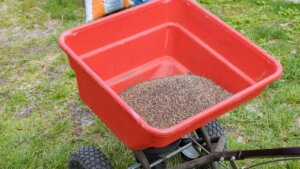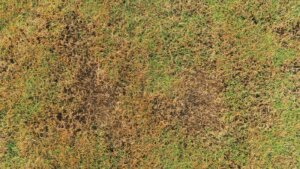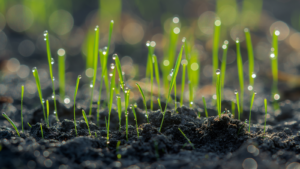Have you ever wondered why, despite your best efforts, your lawn never seems as lush as you’d hoped? The answer may be fluttering around you. Birds, with their sharp eyes for fresh grass seeds, can turn your gardening aspirations into a buffet setup. From the heart of Collegeville, PA, to gardens nationwide, the battle to protect grass seeds from feathered feastings is a universal challenge.
Key Insights:
- Discover why birds are particularly attracted to grass seeds, turning your lawn into their dining area.
- Learn about innovative solutions like bird-repellent-coated seeds and how they offer a new line of defense.
- Explore strategic lawn care practices that enhance your lawn’s resilience against birds without harming the local ecosystem.
This article delves into the reasons behind birds’ appetites for grass seeds and unveils comprehensive strategies to safeguard your lawn. Whether you’re dealing with sparrows, finches, or other seed-loving species, we’ve got the insights you need to protect your green investment
Attracting Avian Guests: The Secret Behind Grass Seed Appeal
Why Small Birds Flock to Fresh Grass Seeds
For many bird species, grass seeds are not just food; they’re a feast. These tiny nutritional powerhouses are irresistible to a variety of birds, including the common sparrows and vibrant finches that might grace your garden. But what makes grass seeds such an appealing meal for these feathered visitors?
The Nutritional Draw of Grass Seeds for Birds
- Essential Nutrients: Grass seeds are packed with the nutrients that birds need to thrive, making them an excellent source of sustenance.
- Easy to Consume: Their small size makes them perfect for birds of all sizes, particularly the smaller varieties that frequent backyards.
- Abundant and Accessible: For birds, a lawn full of grass seeds is like an endless buffet, offering plentiful food without much effort.
Birds are naturally drawn to areas where grass seeds are abundant, seeing them as ideal places to feed. The appeal lies not just in the nutritional content but also in the seeds’ availability, making your garden a hotspot for avian activity.
Strategies to Prevent Birds from Feeding on Newly Seeded Lawns
While we love to see birds in the garden, there are times, especially after sowing new grass, when their presence might not be as welcome. Here are ways to deter birds and protect your grass seeds:
- Use Bird Repellent Tactics: Options range from reflective tapes to ultrasonic deterrents, designed to keep birds at bay without harming them.
- Incorporate Alternative Foods: By providing birds with alternative food sources, like sunflower seeds, you can divert their attention from the newly planted grass.
- Employ Physical Barriers: Netting or floating row covers can effectively prevent birds from accessing freshly sown seeds until they germinate.
Embracing the Cycle of Growth and Nature
Understanding why birds are attracted to grass seeds and how to manage their presence can help you enjoy the beauty of both a lush lawn and a vibrant bird population. By striking the right balance, you can create a garden that thrives, supporting both the growth of new grass and the natural ecosystem.
Selecting Bird-Resistant Grass Seed
Discover Grass Varieties Birds Tend to Ignore
When establishing a lush lawn without the unwelcome feast for our feathered friends, choosing the right type of grass seed becomes crucial. Ryegrass and fescue stand out as the top choices for homeowners aiming to minimize bird attraction. These varieties are known for their lower appeal to birds, making them ideal for establishing a bird-resistant lawn with minimal interference.
Innovative Bird-Repellent Coated Seeds
- What Are Coated Seeds? A revolutionary approach to deterring birds, these seeds are enveloped in a bird-repellent coating. This innovative solution ensures that your grass seeds remain untouched, promoting successful germination and growth.
- Safety First: Despite their repellent properties, these coated seeds are entirely safe for birds if ingested, making them an eco-friendly option for your garden.
Strategies to Enhance Seed Protection from Birds
To further safeguard your freshly seeded lawn from hungry birds, consider integrating these additional strategies:
- Install Bird Feeders: Distract birds with alternative food sources by setting up bird feeders away from the seeded area.
- Apply Mulch: Covering seeds with straw mulch can obscure them from view while retaining moisture for optimal germination.
- Utilize Noise Deterrents: Devices that emit noises unpleasant to birds can provide an extra layer of defense without causing harm.
Embrace a Flourishing Lawn with Peace of Mind
By selecting bird-resistant grass varieties and employing smart protective measures, you can enjoy the dual benefits of a vibrant, healthy lawn and a harmonious backyard ecosystem. This approach not only reduces the likelihood of birds consuming your grass seed but also contributes to the overall well-being of your garden’s visitors.
Beyond the Seeds: Comprehensive Lawn Care
Enlisting Professional Lawn Care to Deter Birds
Achieving a pristine lawn transcends mere seed choice, especially when considering the challenge of keeping birds from eating grass seeds. Professional lawn care services play a pivotal role, offering customized strategies to prevent birds from feasting on your greens. Their expertise not only preserves the aesthetic appeal of your lawn but also safeguards the surrounding ecosystem.
Key Practices for a Lush, Bird-Resistant Lawn
To maintain a lawn that’s both inviting and resilient against avian appetites, consider these essential care practices, often best executed by professionals:
- Aeration: Enhances soil health, facilitating stronger root systems and improved seed germination, lessening the allure for birds.
- Overseeding: Introduces robust grass varieties more resistant to birds and environmental stressors.
- Proper Watering Techniques: Ensures deep root growth and reduces surface attraction for birds seeking worms and seeds.
Implementing Additional Deterrents:
- Strategic Use of Sprays: Non-toxic repellents can dissuade birds without harming them or the environment.
- Physical Barriers: Options like netting can temporarily shield freshly seeded areas from birds.
- Creating Alternative Feeding Areas: Setting up feeders can divert birds, reducing their interest in your lawn.
Do Birds Eat Grass Seed? In Quest for Harmony Between Birds and Lawns
As homeowners, and garden enthusiasts everywhere seek to maintain their verdant paradises, the delicate dance with nature continues.
It’s not about keeping birds away entirely but fostering an environment where both your lawn and local avian populations can flourish. This balance is achievable with thoughtful strategy, a bit of ingenuity, and a commitment to ecological harmony.
Essential Strategies for a Thriving Lawn:
- Grass Seed Selection: Opt for varieties like ryegrass and fescue, known for their lower appeal to our feathered friends.
- Bird-Repellent Coated Seeds: Employ this innovative technology to deter birds safely while promoting seed germination.
- Professional Lawn Care: Leverage expert advice to implement comprehensive care techniques that enhance lawn resilience.
- Bird Deterrent Measures: From reflective tapes to ultrasonic deterrents, find non-harmful ways to protect your seeds.
- Alternative Food Sources: Redirect birds’ attention by offering alternative feeding options like sunflower seeds away from your lawn.
- Physical Barriers: Use netting or row covers temporarily to shield freshly sown seeds, ensuring they have a chance to sprout.
In our quest for the perfect lawn, embracing the wisdom of nature and the expertise of professionals leads us down a path of success. Through the application of targeted strategies and a commitment to the natural world, we create not just a lawn but a vibrant ecosystem where every creature, big and small, finds its place. Join us in Collegeville, PA, and beyond, as we transform our outdoor spaces into bastions of beauty and biodiversity.



